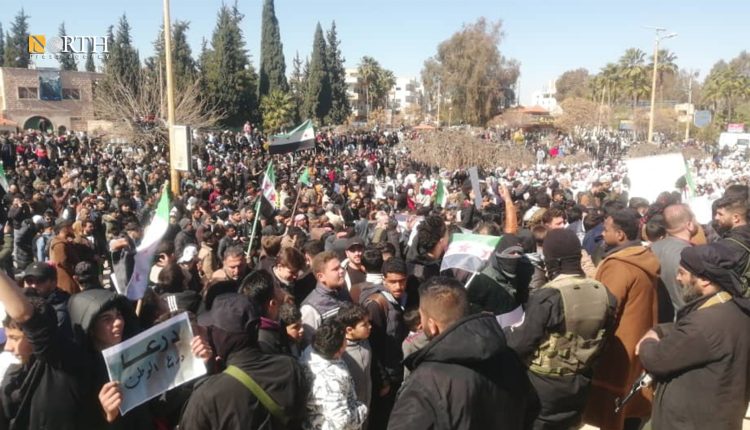Hundreds Protest in Daraa Against Israeli Statements on Southern Syria
By Kardo Roj
DARAA, Syria (North Press) – Hundreds of residents took to the streets of Daraa on Tuesday to protest against recent statements by Israeli Prime Minister Benjamin Netanyahu regarding southern Syria, coinciding with a similar demonstration in Sweida.
Netanyahu had called for the disarmament of areas in Quneitra, Daraa, and Sweida, citing concerns over security and the protection of Druze communities. His remarks were met with strong opposition among Syrians, who view them as foreign interference in the country’s internal affairs.
A local source told North Press that demonstrators gathered in March 18 Square in central Daraa, chanting slogans emphasizing national unity and rejecting any foreign-imposed solutions. “The protesters condemned Netanyahu’s statements, seeing them as an attempt to create internal divisions at a time when Syrians are working to rebuild their country,” the source said.
The protests come amid growing tensions in southern Syria, a region that has experienced ongoing instability since the 2018 Russian-brokered reconciliation between opposition groups and the Syrian government. While the deal allowed some former opposition fighters to integrate into local security forces, sporadic clashes, assassinations, and protests against government policies have persisted.
Israel has long expressed concerns over Iranian and Hezbollah presence in Syria, frequently carrying out airstrikes on military targets linked to Tehran. However, Netanyahu’s recent remarks focused specifically on the need to disarm factions in southern Syria, particularly in Druze-populated areas. This has fueled speculation over Israel’s broader strategic interests in the region.
Tuesday’s protests reflected widespread rejection of Netanyahu’s comments across various Syrian communities. Demonstrators in Daraa, a city known as the birthplace of the 2011 Syrian uprising, carried banners emphasizing national sovereignty and denouncing external interference.
“The Syrian people alone should decide the future of their country,” one protester told North Press. “Netanyahu’s remarks are an insult to our struggle for stability.”
In Sweida, a region predominantly inhabited by the Druze community, similar protests erupted. Local activists argued that the Israeli Prime Minister’s statements aimed to exploit sectarian divisions, portraying Druze communities as in need of Israeli protection.
The Syrian government has also condemned Netanyahu’s call for disarmament, with state media labeling it as a violation of Syria’s sovereignty. Pro-government analysts argue that such statements serve as a pretext for increased Israeli military activity in the Golan Heights and southern Syria.
Meanwhile, regional experts note that Israel’s concerns over Hezbollah and Iranian influence in Syria remain a key driver of its policies. The Israeli army has repeatedly targeted Iranian-linked positions in Syria, fearing an entrenched Iranian presence near its borders. However, calls for disarmament of local factions in Daraa and Sweida suggest a shift in focus toward domestic Syrian dynamics.
The protests in Daraa and Sweida highlight the deep sensitivities surrounding foreign involvement in Syria’s post-war landscape. While the situation in southern Syria remains fragile, growing public opposition to external interference could shape future developments in the region.
It remains unclear whether Netanyahu’s statements will translate into concrete Israeli actions, but the strong response from Syrian communities suggests that any attempt to alter the region’s dynamics will face significant resistance.

